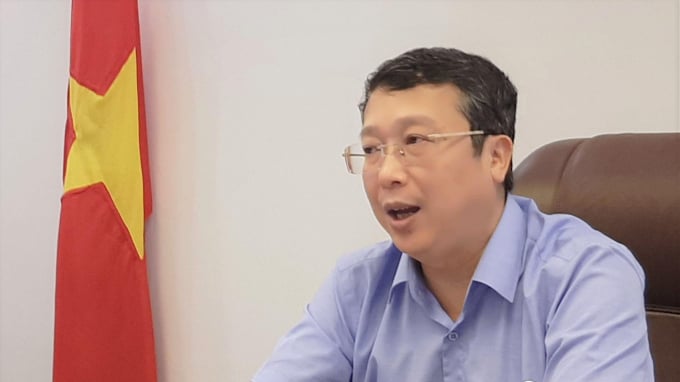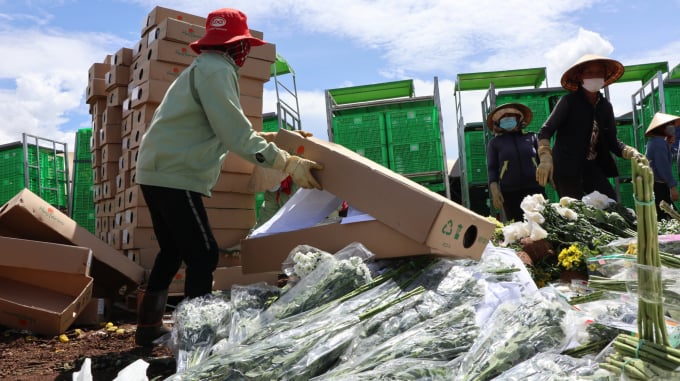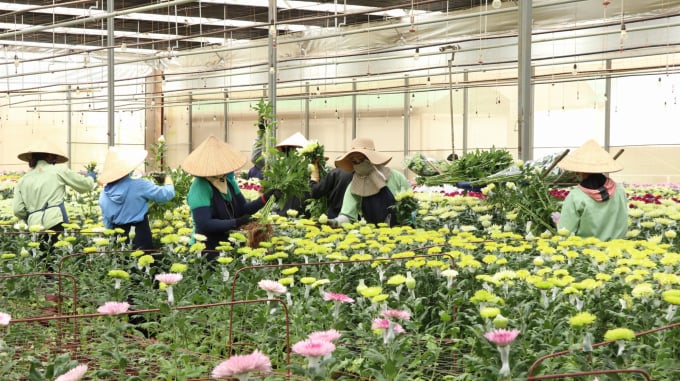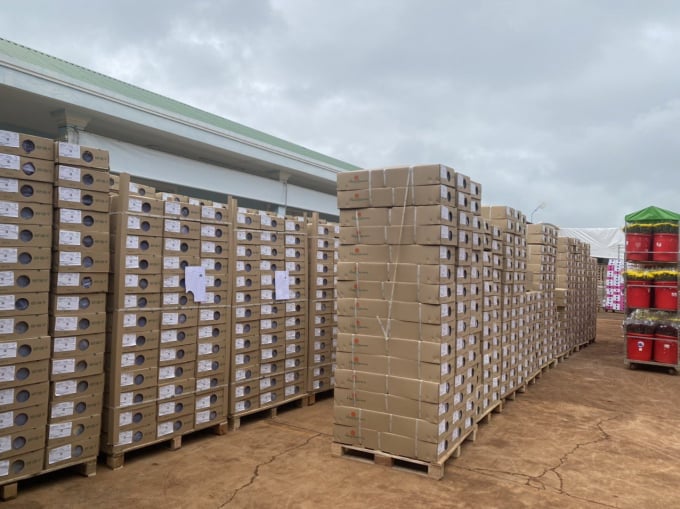June 17, 2025 | 09:43 GMT +7
June 17, 2025 | 09:43 GMT +7
Hotline: 0913.378.918
June 17, 2025 | 09:43 GMT +7
Hotline: 0913.378.918

Mr.Hoang Trung, Director of Plant Protection Department said the Department soon notified the businesses and agencies in Lam Dong province of Vietnam’s Glyphosate ban. Photo: LB.
On July 13, some news agencies reported that hundreds of flower stems of Dalat Hasfarm Company Limited (Dalat Hasfarm, Lam Dong province) was destroyed as they could not be exported to Australia.
The reason is that since July 1, 2021, herbicides containing Glyphosate have been banned in Vietnam while Glyphosate is an active ingredient used by Dalat Hasfarm to treat chrysanthemum cuttings in order to kill flower buds.
On July 14, the Plant Protection Department under the Ministry of Agriculture and Rural Development (MARD) provided clear answer related to this issue to press agencies
According to Hoang Trung, Director of the Plant Protection Department: Since April 2019, the MARD has decided on the removal of pesticides containing the active ingredient glyphosate from the list of pesticides allowed for use in Vietnam.
Circular No. 10/2020/TT-BNNPTNT dated September 9, 2020 of the MARD stipulating that pesticides containing the active ingredient Glyphosate are banned from manufacturing and importing and can be sold and used in Vietnam until June 30, 2021. Beyond the date, enterprises which till have the active ingredient Glyphosate in storages must destroy the products according to current regulations.
The ban on import, circulation and use of the active ingredient Glyphosate has ample legal basis in accordance with Vietnamese law tailoring to the international best practice as well as Vietnam’s orientation of pesticide management.
At the same time, the MARD also has two-year roadmap (from April 2019 until the end of June 2021) as a transition period to facilitate enterprises to proactively make plans on importing, manufacturing and using pesticides containing Glyphosate in order to avoid damaging effects on production and business.

Due to being unable to export to Australia as planned a number of chrysanthemum cuttings of Dalat Hasfarm has been destroyed in recent days. Photo: MH.
Regarding to Vietnam’s flower production and exports, Hoang Trung said so far Vietnam has exported a wide variety of flowers to almost 20 countries and territories around the world such as EU, Japan, South Korea, Malaysia and Taiwan.
For the Australian market, according to the country’s plant quarantine standards, two types of flowers including cut chrysanthemums and carnations are required to be treated by dipping the cuttings into solution containing the active ingredient Glyphosate (content 0.25%-0.5%). This measure is intended to prevent the germination of flower stems and to eliminate the risk of the invasion by exotic plant species into Australia.
Before Circular No.10/2020/TT-BNNPTNT takes effect since July 1, 2021, the Plant Protection Department said over the past time, the department had many written answers and informed Dalat Hasfarm and other relevant agencies and units of Lam Dong province such as Lam Dong National Assembly Delegation, the People’s Committee of Lam Dong province, Da Lat Flower Association, flower producers, traders and exporters in Lam Dong of the regulations and the ban on circulation and use of Glyphosate in Vietnam as well as the requirements of plant quarantine when exporting flowers to foreign countries including Australia.

Chrysanthemum cuttings exported to Australia account for a small proportion of the total flower exports. Photo: HM.
Hoang Trung affirmed that he worked directly with Dalat Hasfarm about this issue. Accordingly, he clearly informed Dalat Hasfarm of the policy, roadmap and regulations of the inevitable ban on the import, use and circulation of Glyphosate in Vietnam.
Thereby, he asked Dalat Hasfarm to make plan to put an alternative active ingredient into use to treat chrysanthemum and carnation cuttings for exports to Australia.
Accordingly, the Department and Dalat Hasfarm agreed to test an alternative to Glyphosate. After that, the Department sent all technical documents of the testing to Australia as well as continuously negotiated with Australia to obtain its agreement on the alternative to Glyphosate as soon as possible.
While waiting for the permission from Australia, Hoang Trung said that in the short term, in order to solve difficulties, Dalat Hasfarm as well as other enterprises exporting flowers (cut chrysanthemums and carnations) to Australia need to find alternative markets for flower exports.
News source from Dalat Hasfarm said that flower exports (Excluding chrysanthemum and carnation cuttings exported to Australia) to other markets such as Japan, South Korea and Taiwan are still not affected.

Plant Protection Department said it would make the best effort to get an approval Australia for an alternative to Glyphosate to treat chrysanthemum and carnation cuttings (in photo: Dalat Hasfarm’s flowers are prepared for exports). Photo: MH.
Currently, only cut chrysanthemum and carnation exports to Australia are affected while other flowers including auspicious flowers, roses, phalaenopsis orchids are still exported to Australia and other countries as normally.
Even for chrysanthemum and carnation cuttings, at present only Australia requires for treating the cuttings with Glyphosate while other markets such as Japan, South Korea, EU, Taiwan and Malaysia do not require that. Therefore, flower exports to these markets still take place effectively.
In addition, cut chrysanthemum and cut carnation exports to Australia account for a small proportion of the total flower exports.
“We really share with what Dalat Hasfarm is facing because currently the Covid-19 is making the production and consumption of flowers more challenging in the domestic market, especially in big cities. Not only flowers but many Dalat fruits and vegetables are also in the same situation. However, the ban on circulation and use of Glyphosate from July 1, 2021 as regulated by legislation is unavoidable”, Hoang Trung, Director of Plant Protection Department emphasized.

(VAN) The UNESCO Global Geopark revalidation of Non nuoc Cao Bang and the transition to a two-tier administrative model are presently undergoing a pivotal moment in Cao Bang, the northernmost province of Vietnam.
/2025/06/13/5330-2-004539_953.jpg)
(VAN) Changing policy mindset and removing investment barriers are urgent requirements to open up new development space for enterprises in the agricultural sector.

(VAN) The areas include the restoration of five million hectares of marine ecosystems.

(VAN) Dr. Le Van Nguyen, Director of the Institute of E-Commerce Management (ECM), emphasizes the potential for green development through the cultivation of fruit trees, particularly in provinces such as Son La.

(VAN) VAAS and numerous Vietnamese enterprises have signed cooperation agreements with Japanese partners to promote agricultural technology and trade connectivity.
/2025/05/29/5625-12-214801_567.jpg)
(VAN) Provincial mergers in the Mekong Delta promise to streamline administration, expand inter-provincial raw material areas, and foster close linkages in agricultural value chains, benefiting both businesses and cooperatives.

(VAN) Merging Mekong Delta provinces contributes to the expansion of agricultural raw material areas, addressing previous constraints caused by provincial boundaries. Additionally, this expansion will reduce costs and strengthen linkages between businesses, cooperatives, and farmers.